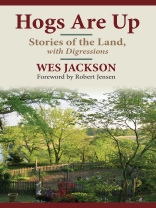Hogs Are Up: Stories of the Land, with Digressions reveals what makes Wes Jackson tick. What kind of lessons does he draw from his unique life experiences, and how do they shape his profoundly revolutionary worldview? Sometimes funny, sometimes wistful, always insightful, this volume demonstrates that when telling a good story, digressions can be the main point. Born during the Great Depression, Jackson tells stories of his youth on a diversified farm in the Kansas River Valley near Topeka, Kansas, culminating in more than forty years of leadership to radically transform agriculture, literally at its very roots. Wes Jackson draws deeply from the lessons learned from his experience dating from World War II to his work at The Land Institute to establish a new Natural Systems Agriculture. But this book is more than that. It includes an eclectic mix of thinkers and doers he’s met along the way.
Wes Jackson is heavily influenced by the cultural legacy of his grandparents, all four of whom were born before the Civil War began, and from his parents, who were born before 1900. He was born into a culture of crop diversity where animals and people were out in the fields and around. He saw the tractor arrive and the horses leave. After you read Hogs Are Up: Stories of the Land, with Digressions you may share his misgivings about what conventional thinkers see as “progress.”
Jackson is constantly exploring the world around him and will engage anyone who can help him think about a discovery, an experiment, or recent insight. Jackson believes that our insights must go beyond the latest scholarly study and government report if we are to get the necessary interest for people to change. The stories and digressions he shares in Hogs Are Up are the fruit of a longtime effort to lay the agricultural and cultural foundation for a new worldview grounded in nature’s principles and located in rural communities able to survive through a new relationship of humanity to the ecosphere.
Table of Content
Foreword: “Tell about it, ” by Robert Jensen
Where to Begin and End?
Introduction
Getting the story right can be complicated. Perspective matters. Sometimes the truth sneaks up on you.
Year of Decision 1976: The Rest of the Story
Down from the College
One Thing Leads to Another
Some stories have to wander, and that’s just fine.
Over the Fence is Out: Softball Rules at West Indianola, District
Sharon Stays at Home, Mostly
Why Can’t I Pick Up Dug Potatoes Fast?
A Private’s Supper on the Oregon Trail near Topeka
My Rural Life
Living with less cultivates virtues, though a bit of vice is inevitable wherever one lives.
The Matfield Green Women’s Club
Uncle John
My Life with Plants and Their Ecosystems: 1936-1952
How Knowing the FFA Creed Came in Handy
Brother Harley at the European Union Parliament
Schooling, Formal and Informal
We often learn the most from the most unusual people.
My Start in Botany: Earning a C, the Hard Way
Dr. Wassermann
Doc Horr
Harry Mason
Scientifically Speaking
I eventually learned that science isn’t a set of facts, theories, or methods, but rather is a way*#8212;though not the only way—of being in theworld.
A Field Trip with Three Great Scientists
An Appeal to the Russians
The Lilac Tree Is in Near-Full Bloom This Morning, but So What?
Ideas I’ve Run into along the Way
It can be dangerous to think too much. but it’s even more dangerous to think too little.
The Danger of Nuance without News
Wondering about the Origin of fire
How Lothar Convinced Me that Dinosaurs Did Not Exist until Humans Discovered Them
David Defeats Goliath
Living in the Industrial World
We have a love/hate relationship with the world we have made. We might as well get used to it.
Satan Is on the Other End
E. F. Schumacher Visits the Land, March 1977
The Shard and My Chevy Silverado
Thoughts on the Natural History of Eden
What is to Become of Us?
What do we need to be if there is to be a future? Who do we need to be?
The Day I Discovered that I Am a Groupie
The Necessity of Insulting the Meat: Ferocious Egalitarianism
Leland
Conclusion: Hardening Off
Notes
About the author
Wes Jackson is cofounder and president emeritus of The Land Institute in Salina, Kansas, and the author of numerous articles and books, including most recently Nature as Measure: The Selected Essays of Wes Jackson and Consulting the Genius of the Place: An Ecological Approach to a New Agriculture.












